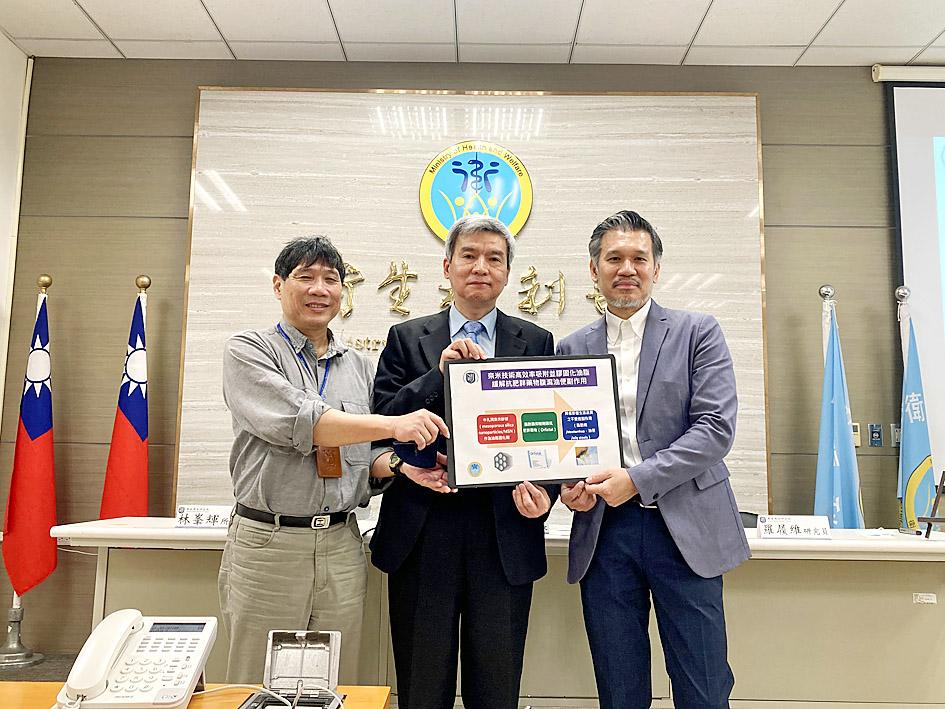The National Health Research Institutes (NHRI) are in talks with Taiwanese companies to produce a unique nanomaterial found to reduce the side effects of obesity treatment drugs, an NHRI researcher said yesterday.
Lo Leu-wei (羅履維), an Institute of Biomedical Engineering and Nanomedicine researcher, said that his team has developed a unique nanomaterial — using mesoporous silica nanoparticles (MSNs) — to reduce the side effects of lipase inhibitor-based obesity treatment medications.
The NHRI is in talks with three Taiwanese firms to mass produce MSNs, he said.

Photo: CNA
Calling obesity a disease of modern civilization, Lo, citing WHO data, said that obese people comprise 40 percent of the global population.
Health Promotion Administration data show that 26.7 percent of Taiwanese were classified as obese in 2018.
Obesity can cause many chronic diseases, making weight control one of the world’s most urgent health issues, he said.
Most diet pills on the market contain orlistat, a lipase inhibitor that reduces the degradation and absorption of gastrointestinal fat, resulting in excess fat being excreted from the large intestine.
Drugs such as orlistat are often associated with unpleasant side effects, such as diarrhea and oily stool, Lo said.
However, the high surface area of MSNs maximize their oil absorption and gelatinization capabilities, he said.
The silicon dioxide that comprises MSNs is also biocompatible, and has been widely utilized in food additives and as an antacid in gastrointestinal medications, he added.
These characteristics make MSNs attractive to use in conjunction with drugs such as orlistat, he said.
Once approved by the Food and Drug Administration, MSNs could be used as a part of combination therapy with orlistat or as a dietary supplement, he added.
The key concepts and technologies relevant to the creation of the nanomaterial have already won several awards in Taiwan and have been granted patent rights in Taiwan, Canada, China, the EU and the US.

Actress Barbie Hsu (徐熙媛) has “returned home” to Taiwan, and there are no plans to hold a funeral for the TV star who died in Japan from influenza- induced pneumonia, her family said in a statement Wednesday night. The statement was released after local media outlets reported that Barbie Hsu’s ashes were brought back Taiwan on board a private jet, which arrived at Taipei Songshan Airport around 3 p.m. on Wednesday. To the reporters waiting at the airport, the statement issued by the family read “(we) appreciate friends working in the media for waiting in the cold weather.” “She has safely returned home.

Twenty-four Republican members of the US House of Representatives yesterday introduced a concurrent resolution calling on the US government to abolish the “one China” policy and restore formal diplomatic relations with Taiwan. Led by US representatives Tom Tiffany and Scott Perry, the resolution calls for not only re-establishing formal relations, but also urges the US Trade Representative to negotiate a free-trade agreement (FTA) with Taiwan and for US officials to advocate for Taiwan’s full membership in the UN and other international organizations. In a news release announcing the resolution, Tiffany, who represents a Wisconsin district, called the “one China” policy “outdated, counterproductive

A Vietnamese migrant worker on Thursday won the NT$12 million (US$383,590) jackpot on a scratch-off lottery ticket she bought from a lottery shop in Changhua County’s Puyan Township (埔鹽), Taiwan Lottery Co said yesterday. The lottery winner, who is in her 30s and married, said she would continue to work in Taiwan and send her winnings to her family in Vietnam to improve their life. More Taiwanese and migrant workers have flocked to the lottery shop on Sec 2 of Jhangshuei Road (彰水路) to share in the luck. The shop owner, surnamed Chen (陳), said that his shop has been open for just

MUST REMAIN FREE: A Chinese takeover of Taiwan would lead to a global conflict, and if the nation blows up, the world’s factories would fall in a week, a minister said Taiwan is like Prague in 1938 facing Adolf Hitler; only if Taiwan remains free and democratic would the world be safe, Deputy Minister of Foreign Affairs Francois Wu (吳志中) said in an interview with Italian newspaper Corriere della Sera. The ministry on Saturday said Corriere della Sera is one of Italy’s oldest and most read newspapers, frequently covers European economic and political issues, and that Wu agreed to an interview with the paper’s senior political analyst Massimo Franco in Taipei on Jan. 3. The interview was published on Jan. 26 with the title “Taiwan like Prague in 1938 with Hitler,” the ministry